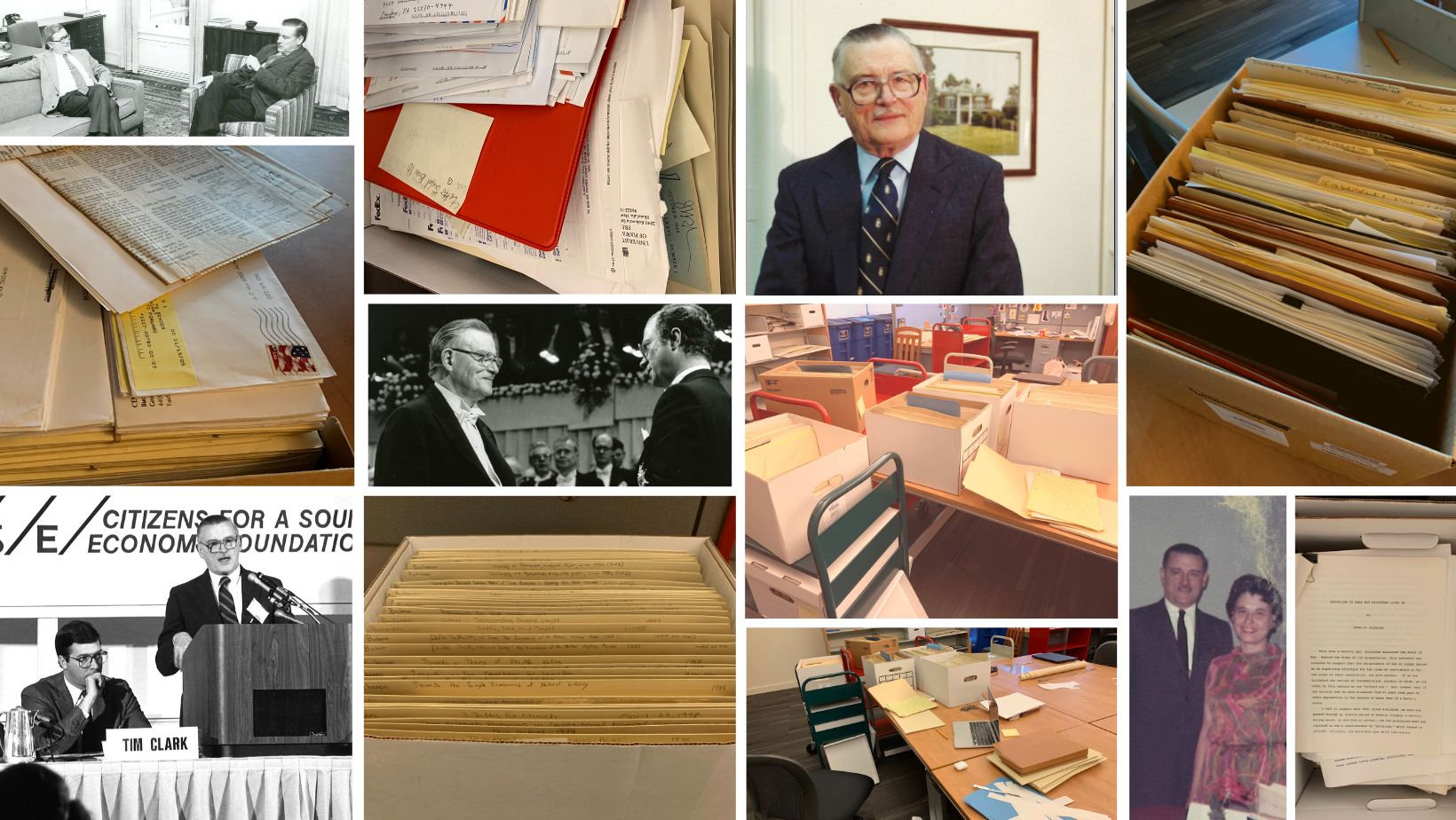This post was written by Processing Student Assistants for the NEH Buchanan Papers Processing Project, Vilma Chicas Garcia and Colin McDonald. Both students have contributed invaluable time and effort to the project – thank you Vilma and Colin!
The Life of an Economist by Colin McDonald

Colin McDonald.
When I first came to work at the Special Collections Research Center I didn’t really know who James Buchanan was. I had heard the term “public choice theory” in an introductory environmental economics class, but I hadn’t expected to be working on a collection of the “father” of the field. Although he was a Nobel Laureate and one of the authors of the strategy used by radical right billionaires to influence American politics (according to Nancy MacLean anyway), few people know who he is. To me it seems James Buchanan exists in that awkward area of semi-known in his field, and unknown to virtually anyone else. If I tell people that I work on the archival collection of James Buchanan, I have to clarify “the economist, not the president.” I think this is largely by Buchanan’s design; he was a reticent person who valued his privacy, wanting any attention to be on his work and ideas, not on him. In Democracy in Chains MacLean writes “At his memorial service, in 2013, a friend of thirty years was asked how he had gotten to know Buchanan. ‘Did I?’ he responded.”
Before the age of digital communication a lot more things were written down on paper. This may be an obvious observation, but it is something that I came to more fully appreciate working on this collection. I think this collection differs from others in the breadth and the minutiae of its contents; birthday cards, intra-economics-department politics, travel arrangements (Buchanan traveled a lot), a complaint about soup being heated in a communal microwave. These accumulated materials allow for glimpses into the day-to-day life of James Buchanan. All these little details are now captured and stored in the archives at SCRC, filed away for researchers to look over as they try to piece together who Buchanan was and the impact that he had.
Something else I learned while working at SCRC is the importance of having a trained archivist overseeing the processing of a collection. Rebecca Thayer was the project archivist for the James Buchanan papers and deserves recognition for being in charge of turning the mess of decades worth of papers that was being kept at the Buchanan House into a proper archival collection, as well as being an amazing supervisor. I’m glad to have been part of the team that prepared this collection, and that researchers will soon be able to access the James M. Buchanan papers.
…

Vilma Chicas Garcia (and her cat Kona.)
By Vilma Chicas Garcia
The James M. Buchanan papers has been an incredible learning experience that has solidified my decision to work within archives. I had no processing experience before the Buchanan project, but there was no better place to gain experience than at the Special Collections and Record Center (SCRC). I arrived at George Mason unsure of what I wanted to do career-wise; all I knew was that I wanted to study history. I have worked with archival material before on research projects, but I had only considered working within archives in the summer of 2022. I stumbled upon archival work on TikTok and immediately felt it was a profession I wanted to pursue, but I did not know where to start or whether it would be the right fit for me. I was lucky enough to find this part-time position at the SCRC and work alongside exceptional people who helped me every step of the way.
Processing work can be repetitive, especially in a collection as vast as Buchanan’s. However, there was always something to learn, or to question, which kept the work interesting. This job required me to utilize a different set of skills I had yet to use in a work environment. I can see now why this field values hands-on experience as much as it does. I don’t know if there is any other way to truly grasp what this work requires without doing it for yourself. I didn’t realize how much research and patience was needed to do this type of work, but I immensely enjoyed it. Reprocessing archival materials requires a balance; figuring out how to label each folder to best summarize its contents and assist researchers without straying too far away from the original order is a skill learned over time and through practice. I am far from an expert, but I am excited to come to work every day and learn more about this field.
Follow SCRC on Social Media and look out for future posts on our Facebook, Instagram, and Twitter accounts. To search the collections held at Special Collections Research Center, go to our website and browse the finding aids by subject or title. You may also e-mail us at speccoll@gmu.edu or call 703-993-2220 if you would like to schedule an appointment, request materials, or if you have questions.

